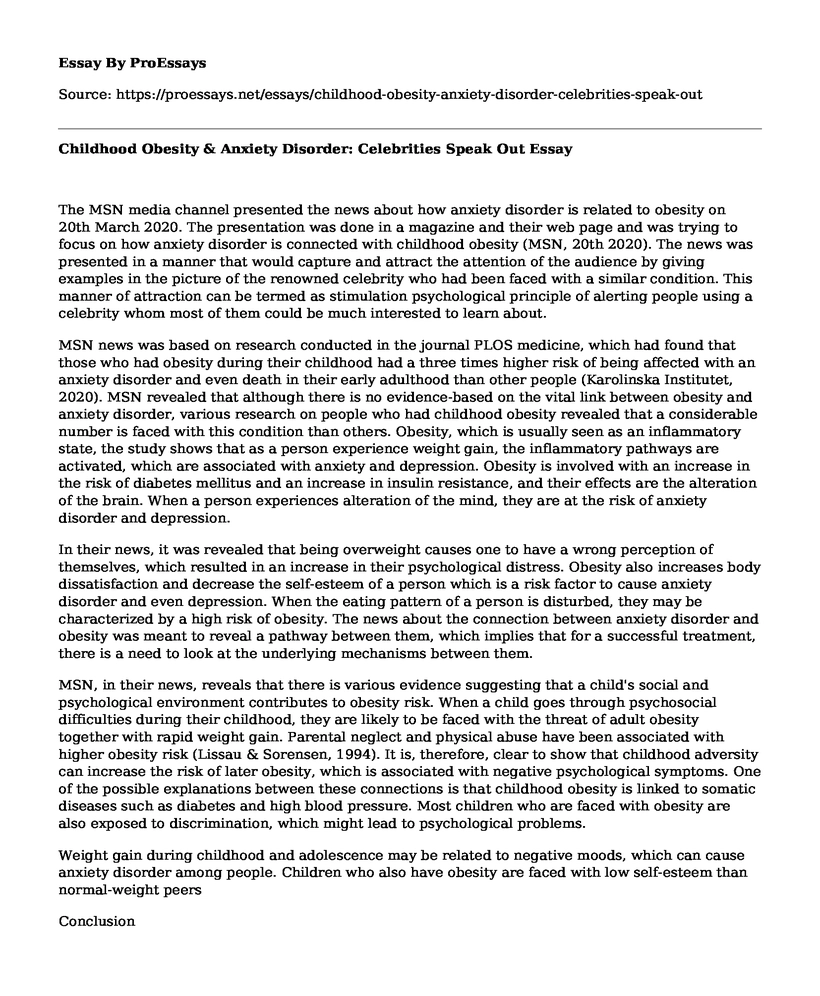The MSN media channel presented the news about how anxiety disorder is related to obesity on 20th March 2020. The presentation was done in a magazine and their web page and was trying to focus on how anxiety disorder is connected with childhood obesity (MSN, 20th 2020). The news was presented in a manner that would capture and attract the attention of the audience by giving examples in the picture of the renowned celebrity who had been faced with a similar condition. This manner of attraction can be termed as stimulation psychological principle of alerting people using a celebrity whom most of them could be much interested to learn about.
MSN news was based on research conducted in the journal PLOS medicine, which had found that those who had obesity during their childhood had a three times higher risk of being affected with an anxiety disorder and even death in their early adulthood than other people (Karolinska Institutet, 2020). MSN revealed that although there is no evidence-based on the vital link between obesity and anxiety disorder, various research on people who had childhood obesity revealed that a considerable number is faced with this condition than others. Obesity, which is usually seen as an inflammatory state, the study shows that as a person experience weight gain, the inflammatory pathways are activated, which are associated with anxiety and depression. Obesity is involved with an increase in the risk of diabetes mellitus and an increase in insulin resistance, and their effects are the alteration of the brain. When a person experiences alteration of the mind, they are at the risk of anxiety disorder and depression.
In their news, it was revealed that being overweight causes one to have a wrong perception of themselves, which resulted in an increase in their psychological distress. Obesity also increases body dissatisfaction and decrease the self-esteem of a person which is a risk factor to cause anxiety disorder and even depression. When the eating pattern of a person is disturbed, they may be characterized by a high risk of obesity. The news about the connection between anxiety disorder and obesity was meant to reveal a pathway between them, which implies that for a successful treatment, there is a need to look at the underlying mechanisms between them.
MSN, in their news, reveals that there is various evidence suggesting that a child's social and psychological environment contributes to obesity risk. When a child goes through psychosocial difficulties during their childhood, they are likely to be faced with the threat of adult obesity together with rapid weight gain. Parental neglect and physical abuse have been associated with higher obesity risk (Lissau & Sorensen, 1994). It is, therefore, clear to show that childhood adversity can increase the risk of later obesity, which is associated with negative psychological symptoms. One of the possible explanations between these connections is that childhood obesity is linked to somatic diseases such as diabetes and high blood pressure. Most children who are faced with obesity are also exposed to discrimination, which might lead to psychological problems.
Weight gain during childhood and adolescence may be related to negative moods, which can cause anxiety disorder among people. Children who also have obesity are faced with low self-esteem than normal-weight peers
Conclusion
The news presented by MSN was a clear indication that the best way of controlling the obesity epidemic involves the understanding of the underlying relationship between childhood obesity and anxiety disorder. When the strong correlation between them is established, it will be much easier to come up with the treatment mechanism to use in dealing with the problem. Childhood obesity has been recognized as one of the most severe public health in the currently and it is necessary to find the root cause of the problem.References
MSN (20th March 2020), Childhood obesity linked to a higher risk of anxiety and depression 20th March 2020, MSN https://www.msn.com/en-us/health/wellness/new-research-links-obesity-in-childhood-to-a-higher-risk-of-anxiety-depression-and-early-death/ar-BB11qjDNLissau & Sorensen T. Parental neglect during childhood and increased risk of obesity in young adulthood Lancet 1994; 343324- 327PubMedGoogle Scholar Crossref https://www.sciencedirect.com/science/article/pii/S0140673694911630
Karolinska Institutet. (2020, 18th March). Childhood obesity linked to higher risk of anxiety, depression and premature death. Science Daily. Retrieved 27th April 2020 from www.sciencedaily.com/releases/2020/03/200318143706.htm
Cite this page
Childhood Obesity & Anxiety Disorder: Celebrities Speak Out. (2023, May 30). Retrieved from https://proessays.net/essays/childhood-obesity-anxiety-disorder-celebrities-speak-out
If you are the original author of this essay and no longer wish to have it published on the ProEssays website, please click below to request its removal:
- Research Paper Example on Project Management
- Napkin Ring Problem Analysis
- Leadership Interview Analysis Paper Example
- Evaluation Paper Example on Air Canada
- Essay on Preventing Workplace Violence: What I Learned at the Conference
- Essay Example on COBIT Model: Crucial for Integrated IT Governance
- Paper Sample on Leadership: A Vital Element of Society's Governance







